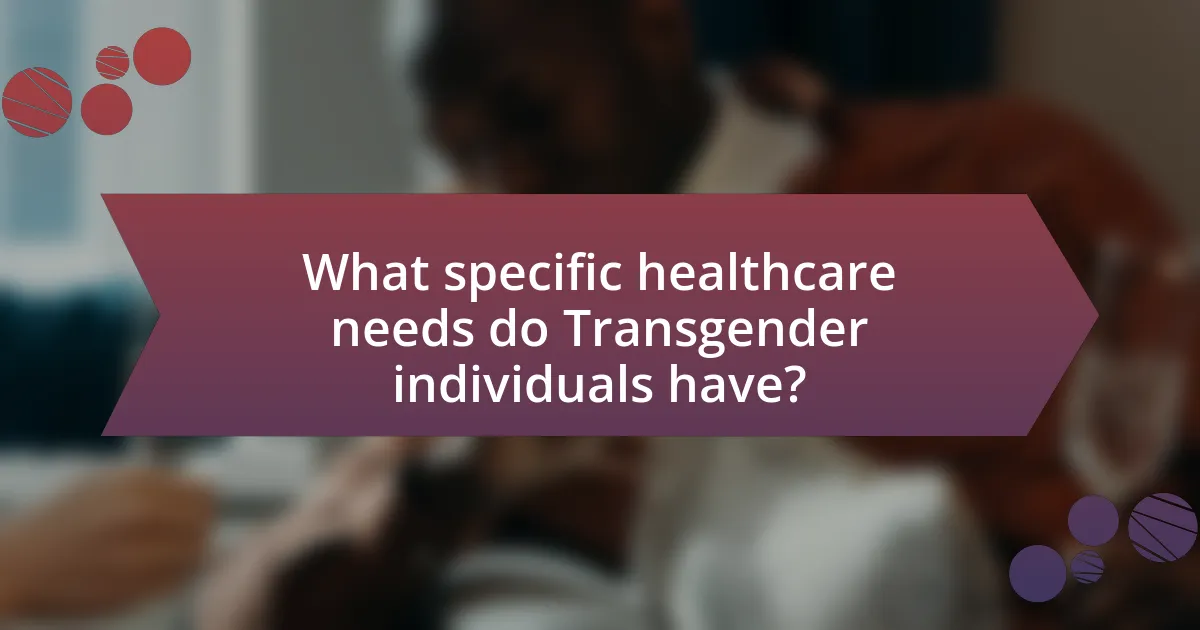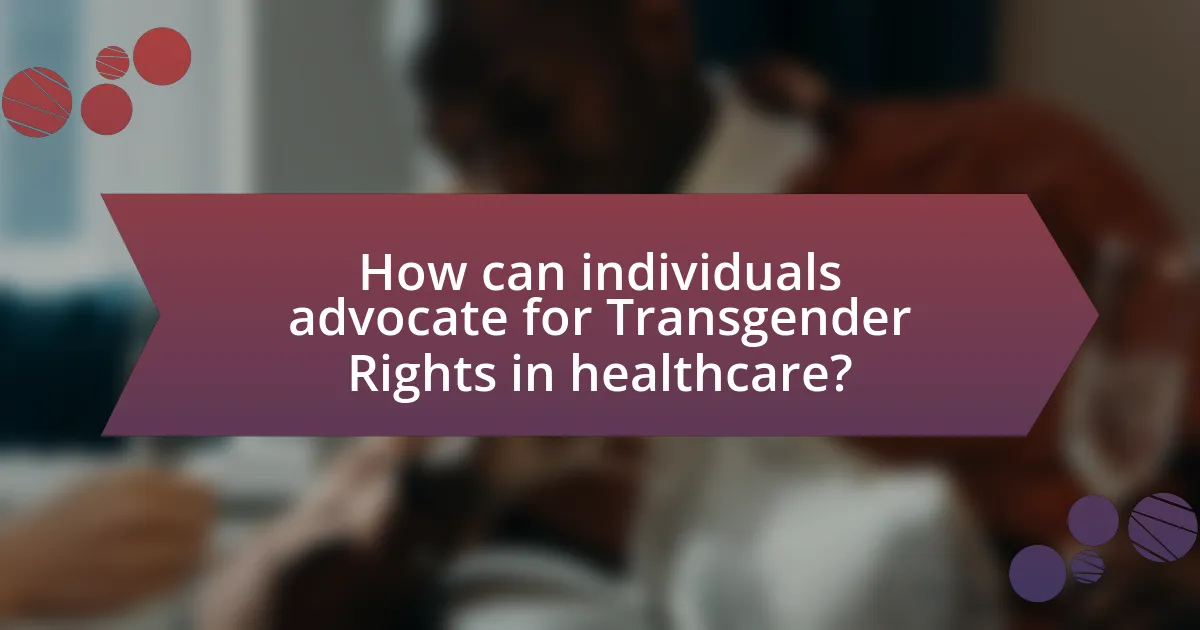Transgender rights in healthcare encompass the legal and ethical entitlements that ensure transgender individuals have equitable access to medical services without discrimination based on gender identity. This article outlines the importance of these rights, the historical context that has shaped them, and the impact on health outcomes for transgender individuals. It discusses existing legal protections, the challenges faced in accessing healthcare, and the role of healthcare providers in supporting transgender rights. Additionally, it highlights the significance of insurance coverage, available resources, and advocacy efforts necessary to promote inclusive healthcare practices for the transgender community.

What are Transgender Rights in Healthcare?
Transgender rights in healthcare refer to the legal and ethical entitlements that ensure transgender individuals receive equitable access to medical services, free from discrimination based on their gender identity. These rights include the ability to access gender-affirming treatments, such as hormone therapy and surgeries, as well as the right to have their gender identity recognized in medical records and documentation. According to the American Medical Association, denying these rights can lead to significant health disparities, as transgender individuals often face barriers to care, including stigma and lack of provider knowledge. Legal protections vary by region, but many jurisdictions have enacted laws to safeguard these rights, promoting inclusive healthcare practices.
Why are Transgender Rights important in the healthcare system?
Transgender rights are crucial in the healthcare system because they ensure equitable access to medical services for transgender individuals. When healthcare systems recognize and uphold these rights, they reduce barriers to care, which is essential for the physical and mental well-being of transgender people. Studies indicate that transgender individuals face significant health disparities, including higher rates of mental health issues and chronic conditions, often exacerbated by discrimination and lack of access to appropriate care. For instance, the 2015 U.S. Transgender Survey revealed that 33% of respondents reported having at least one negative experience with a healthcare provider related to their gender identity, which underscores the need for rights that protect against discrimination and promote inclusive practices in healthcare settings.
What historical context has shaped Transgender Rights in healthcare?
The historical context that has shaped transgender rights in healthcare includes significant milestones such as the declassification of homosexuality as a mental disorder by the American Psychiatric Association in 1973 and the subsequent recognition of gender dysphoria as a legitimate medical condition. This shift laid the groundwork for advocating for transgender healthcare rights. Additionally, the 2010 Affordable Care Act prohibited discrimination based on gender identity in healthcare settings, further solidifying protections for transgender individuals. The ongoing activism and legal battles, including landmark cases like Obergefell v. Hodges in 2015, which legalized same-sex marriage, have also contributed to the evolving landscape of transgender rights in healthcare. These historical developments reflect a broader societal change towards acceptance and recognition of transgender individuals’ healthcare needs.
How do Transgender Rights impact health outcomes for individuals?
Transgender rights significantly impact health outcomes for individuals by ensuring access to appropriate medical care and reducing discrimination in healthcare settings. Studies indicate that when transgender individuals have legal recognition and protection, they experience better mental health outcomes, including lower rates of depression and anxiety. For instance, the 2015 U.S. Transgender Survey found that 40% of respondents reported serious psychological distress, but those with access to gender-affirming care had significantly improved mental health. Furthermore, legal protections against discrimination in healthcare lead to increased utilization of preventive services, which is crucial for overall health maintenance.
What legal protections exist for Transgender individuals in healthcare?
Transgender individuals are protected in healthcare by various federal and state laws that prohibit discrimination based on gender identity. The Affordable Care Act (ACA) specifically prohibits discrimination in healthcare settings, stating that individuals cannot be denied services based on sex, which includes gender identity. Additionally, the Department of Health and Human Services (HHS) has issued regulations affirming that discrimination against transgender individuals in healthcare is a violation of the ACA. Furthermore, many states have enacted their own laws that provide additional protections, ensuring that transgender individuals have equal access to healthcare services without facing discrimination.
What federal laws support Transgender Rights in healthcare?
The federal laws that support transgender rights in healthcare include Section 1557 of the Affordable Care Act, which prohibits discrimination based on sex, including gender identity, in health programs and activities receiving federal funding. Additionally, the Equal Protection Clause of the Fourteenth Amendment has been interpreted by courts to protect against discrimination based on gender identity. These legal frameworks ensure that transgender individuals have access to necessary healthcare services without facing discrimination.
How do state laws vary regarding Transgender healthcare rights?
State laws regarding transgender healthcare rights vary significantly across the United States, with some states providing comprehensive protections while others impose restrictions. For instance, states like California and New York have enacted laws that ensure access to gender-affirming care, including hormone therapy and surgeries, as part of their Medicaid programs. Conversely, states such as Arkansas and Tennessee have passed legislation that prohibits healthcare providers from offering gender-affirming treatments to minors, reflecting a more restrictive approach. This disparity is further highlighted by the fact that as of 2023, 18 states have laws that explicitly protect transgender individuals’ rights to access healthcare, while 11 states have enacted laws that limit or ban such access.
What challenges do Transgender individuals face in accessing healthcare?
Transgender individuals face significant challenges in accessing healthcare, primarily due to discrimination, lack of provider knowledge, and financial barriers. Discrimination manifests in both overt and subtle forms, leading to negative experiences that discourage individuals from seeking necessary care. A study published in the American Journal of Public Health found that 33% of transgender individuals reported being denied care due to their gender identity. Additionally, many healthcare providers lack adequate training on transgender-specific health needs, resulting in inadequate or inappropriate care. Financial barriers also play a critical role, as many transgender individuals face higher healthcare costs and may lack insurance coverage for gender-affirming treatments. According to the National Center for Transgender Equality, 19% of transgender individuals reported being uninsured, further complicating their access to essential healthcare services.
What are common barriers to healthcare for Transgender individuals?
Common barriers to healthcare for transgender individuals include discrimination, lack of knowledgeable providers, and inadequate insurance coverage. Discrimination can manifest in negative attitudes from healthcare staff, leading to avoidance of necessary medical care. A study published in the American Journal of Public Health found that 33% of transgender individuals reported experiencing discrimination in healthcare settings. Additionally, many healthcare providers lack training on transgender-specific health needs, resulting in inadequate care. Furthermore, insurance plans often exclude coverage for gender-affirming treatments, which can prevent access to essential services. According to the National Center for Transgender Equality, 19% of transgender individuals reported being denied coverage for necessary healthcare services due to their gender identity.
How does discrimination manifest in healthcare settings?
Discrimination in healthcare settings manifests through unequal treatment, denial of services, and biased attitudes towards patients based on their gender identity. For instance, transgender individuals often face barriers such as refusal of care, lack of knowledgeable providers, and inappropriate questioning about their gender identity, which can lead to negative health outcomes. Research indicates that 19% of transgender individuals reported being refused care due to their gender identity, according to the 2015 U.S. Transgender Survey conducted by the National Center for Transgender Equality. This highlights the systemic issues within healthcare that contribute to discrimination against transgender patients.
How can healthcare providers support Transgender Rights?
Healthcare providers can support transgender rights by implementing inclusive policies and practices that respect and affirm the identities of transgender individuals. This includes using correct names and pronouns, providing comprehensive training on transgender health issues, and ensuring access to gender-affirming care. Research indicates that when healthcare providers create a welcoming environment, it significantly improves health outcomes for transgender patients, as highlighted in the 2015 U.S. Transgender Survey, which found that 33% of respondents avoided medical care due to fear of discrimination. By actively addressing these barriers, healthcare providers can foster a more equitable healthcare system for transgender individuals.
What training is necessary for healthcare providers to understand Transgender issues?
Healthcare providers need comprehensive training that includes understanding gender identity, cultural competency, and specific medical needs of transgender individuals. This training should cover the basics of gender diversity, the impact of societal stigma, and the importance of using correct pronouns and names. Evidence from the National Center for Transgender Equality indicates that informed healthcare providers can significantly improve health outcomes for transgender patients by fostering a supportive environment. Additionally, training programs should incorporate case studies and role-playing scenarios to enhance empathy and practical skills in addressing transgender health issues.
How can healthcare facilities create inclusive environments for Transgender patients?
Healthcare facilities can create inclusive environments for transgender patients by implementing comprehensive training programs for staff on gender identity and sensitivity. Such training ensures that healthcare providers understand the unique needs and challenges faced by transgender individuals, fostering a respectful and supportive atmosphere. Research indicates that inclusive practices, such as using correct names and pronouns, significantly improve patient satisfaction and health outcomes. For instance, a study published in the American Journal of Public Health found that transgender patients who experienced respectful treatment reported better mental health and overall well-being. Additionally, healthcare facilities should establish clear non-discrimination policies that explicitly include gender identity, ensuring that all patients feel safe and valued.

What specific healthcare needs do Transgender individuals have?
Transgender individuals have specific healthcare needs that include access to gender-affirming treatments, mental health support, and preventive care tailored to their unique experiences. Gender-affirming treatments may involve hormone therapy and surgical procedures that align an individual’s physical appearance with their gender identity, which are essential for their psychological well-being. Mental health support is crucial, as transgender individuals face higher rates of anxiety, depression, and suicidal ideation due to societal stigma and discrimination. Preventive care, including screenings for sexually transmitted infections and routine health check-ups, is also vital, as transgender individuals may encounter barriers to accessing these services. According to the 2015 U.S. Transgender Survey, 40% of respondents reported having attempted suicide in their lifetime, highlighting the urgent need for comprehensive healthcare that addresses both physical and mental health needs.
What types of medical care are essential for Transgender individuals?
Essential medical care for transgender individuals includes hormone therapy, mental health support, and gender-affirming surgeries. Hormone therapy is crucial for aligning an individual’s physical characteristics with their gender identity, which can significantly improve mental well-being and quality of life. Mental health support is vital due to the higher rates of anxiety, depression, and suicidal ideation among transgender individuals, often stemming from societal stigma and discrimination. Gender-affirming surgeries, such as chest or genital surgeries, are important for many individuals to achieve congruence between their gender identity and physical appearance, which can further enhance psychological health. These types of care are supported by various studies, including the 2015 U.S. Transgender Survey, which highlighted the importance of access to comprehensive healthcare for improving the overall health outcomes of transgender individuals.
What role does hormone therapy play in Transgender healthcare?
Hormone therapy plays a crucial role in transgender healthcare by facilitating the physical changes that align an individual’s secondary sexual characteristics with their gender identity. This medical intervention typically involves the administration of estrogen or testosterone, which can lead to significant changes such as breast development, body fat redistribution, and voice deepening. Research indicates that hormone therapy can improve mental health outcomes, with studies showing a reduction in depression and anxiety among transgender individuals undergoing treatment. For instance, a study published in the Journal of Clinical Endocrinology & Metabolism found that 94% of participants reported improved quality of life after starting hormone therapy. Thus, hormone therapy is essential for many transgender individuals seeking to affirm their gender identity and enhance their overall well-being.
How important is mental health support for Transgender individuals?
Mental health support is critically important for transgender individuals due to the high rates of mental health issues they face, including depression and anxiety. Research indicates that transgender individuals experience significantly higher rates of suicidal ideation and attempts compared to their cisgender counterparts, with studies showing that nearly 40% of transgender individuals have considered suicide in their lifetime (Budge, Adelson, & Howard, 2013, Journal of Consulting and Clinical Psychology). Access to mental health support can mitigate these risks by providing essential coping strategies, affirming care, and a safe space for expression, ultimately improving overall well-being and quality of life for transgender individuals.
What are the implications of insurance coverage for Transgender healthcare?
Insurance coverage for transgender healthcare significantly impacts access to necessary medical services, including hormone therapy and gender-affirming surgeries. When insurance plans include transgender healthcare, they reduce financial barriers, enabling individuals to seek treatments that align with their gender identity. According to a 2021 study published in the American Journal of Public Health, states that mandate insurance coverage for transgender healthcare report higher rates of mental health and overall well-being among transgender individuals. Conversely, lack of coverage can lead to increased health disparities, as many may forgo essential care due to costs. Thus, comprehensive insurance coverage is crucial for promoting equitable healthcare access for transgender individuals.
What should individuals know about insurance policies regarding Transgender care?
Individuals should know that insurance policies regarding transgender care can vary significantly, often impacting coverage for gender-affirming treatments. Many insurance plans are required to cover medically necessary transgender-related healthcare under the Affordable Care Act, which prohibits discrimination based on gender identity. However, coverage may still be limited or subject to specific criteria, such as requiring a mental health evaluation or a certain duration of living in the gender role. Additionally, some states have enacted laws mandating that insurance companies provide coverage for transgender healthcare, while others may not. It is crucial for individuals to review their specific policy details, including exclusions and limitations, and to advocate for necessary treatments if coverage is denied.
How can Transgender individuals advocate for better insurance coverage?
Transgender individuals can advocate for better insurance coverage by organizing and participating in campaigns that demand equitable healthcare access. These campaigns can include lobbying efforts directed at policymakers to enact laws that prohibit discrimination in insurance coverage based on gender identity. For instance, the Affordable Care Act prohibits discrimination based on sex, which can be leveraged to argue for comprehensive coverage of gender-affirming treatments. Additionally, individuals can share personal stories and data illustrating the necessity of such coverage, as studies show that access to gender-affirming care significantly improves mental health outcomes for transgender individuals. Engaging with advocacy organizations, such as the Human Rights Campaign or the National Center for Transgender Equality, can also amplify their voices and provide resources for effective advocacy.
What resources are available for Transgender individuals seeking healthcare?
Transgender individuals seeking healthcare can access various resources, including specialized clinics, support organizations, and online platforms. For instance, the World Professional Association for Transgender Health (WPATH) provides a directory of healthcare providers experienced in transgender care. Additionally, organizations like the National Center for Transgender Equality (NCTE) offer resources and advocacy for accessing appropriate healthcare services. Furthermore, local LGBTQ+ community centers often have information on healthcare providers who are knowledgeable about transgender health issues. These resources are crucial for ensuring that transgender individuals receive informed and respectful care tailored to their specific needs.
What organizations provide support and information for Transgender healthcare?
Organizations that provide support and information for transgender healthcare include the World Professional Association for Transgender Health (WPATH), the Human Rights Campaign (HRC), and the National Center for Transgender Equality (NCTE). WPATH offers guidelines for transgender healthcare providers and advocates for the health and well-being of transgender individuals. The HRC provides resources and information on healthcare access and rights for transgender people, while the NCTE focuses on policy advocacy and education to improve healthcare access and quality for the transgender community. These organizations are recognized for their contributions to advancing transgender healthcare and rights.
How can online platforms assist in finding Transgender-friendly healthcare providers?
Online platforms can assist in finding transgender-friendly healthcare providers by offering searchable databases and user-generated reviews that specifically highlight providers’ experience and sensitivity to transgender health issues. For instance, platforms like LGBTQ+ health directories and community forums allow users to filter searches based on criteria such as gender identity, specific healthcare needs, and geographic location. Research indicates that 70% of transgender individuals report difficulty finding healthcare providers who are knowledgeable about their specific health needs (Budge, Adelson, & Howard, 2013, “Anxiety and Depression in Transgender Individuals: The Roles of Social Support and Social Identity”). This underscores the importance of online resources in bridging the gap between transgender patients and appropriate healthcare services.

How can individuals advocate for Transgender Rights in healthcare?
Individuals can advocate for transgender rights in healthcare by actively supporting policies that ensure equitable access to medical services for transgender individuals. This includes lobbying for legislation that prohibits discrimination based on gender identity in healthcare settings, as well as promoting the inclusion of transgender-specific healthcare needs in insurance coverage. Research indicates that transgender individuals face significant barriers to accessing healthcare, with a 2015 U.S. Transgender Survey revealing that 33% of respondents reported being denied care due to their gender identity. By raising awareness, participating in community organizations, and engaging in conversations about the importance of inclusive healthcare practices, individuals can contribute to a more supportive environment for transgender rights in healthcare.
What actions can individuals take to promote Transgender Rights in their communities?
Individuals can promote Transgender Rights in their communities by advocating for inclusive policies and practices that support transgender individuals. This includes engaging with local government to push for anti-discrimination laws, supporting transgender healthcare access, and participating in awareness campaigns that educate the public about transgender issues. Research indicates that communities with supportive policies see improved mental health outcomes for transgender individuals, highlighting the importance of advocacy. For instance, a study published in the American Journal of Public Health found that transgender individuals who live in states with inclusive policies report lower rates of mental health issues.
How can awareness campaigns influence public perception of Transgender healthcare issues?
Awareness campaigns can significantly influence public perception of transgender healthcare issues by educating the public, dispelling myths, and promoting understanding. These campaigns often utilize various media platforms to share accurate information about transgender health needs, which can lead to increased empathy and support for transgender individuals. For instance, a study published in the Journal of Health Communication found that exposure to educational materials about transgender healthcare resulted in more positive attitudes among participants towards transgender individuals and their healthcare rights. By addressing misconceptions and highlighting the importance of inclusive healthcare, awareness campaigns can foster a more informed and supportive public perspective on transgender healthcare issues.
What role do allies play in supporting Transgender Rights in healthcare?
Allies play a crucial role in supporting transgender rights in healthcare by advocating for inclusive policies and practices that ensure equitable access to medical services. Their support helps to raise awareness about the unique healthcare needs of transgender individuals, which can include access to hormone therapy, mental health services, and gender-affirming surgeries. Research indicates that when allies actively engage in advocacy, such as lobbying for non-discriminatory healthcare policies, they contribute to a more supportive environment that can lead to improved health outcomes for transgender people. For instance, a study published in the American Journal of Public Health found that inclusive healthcare policies significantly reduce barriers to care for transgender individuals, highlighting the importance of allyship in fostering systemic change.
What best practices should individuals follow when navigating healthcare as a Transgender person?
Individuals navigating healthcare as a transgender person should prioritize finding knowledgeable and affirming healthcare providers. Research indicates that transgender individuals often face discrimination and lack of understanding from healthcare professionals, which can lead to inadequate care (Budge et al., 2013). Therefore, seeking providers who have experience with transgender health issues and who respect gender identity is crucial.
Additionally, individuals should prepare for appointments by documenting their medical history, including any hormone treatments or surgeries, and be ready to discuss their specific healthcare needs. This preparation can help ensure that healthcare providers have the necessary information to offer appropriate care.
Furthermore, understanding one’s rights is essential; transgender individuals are protected under various laws, including the Affordable Care Act, which prohibits discrimination based on gender identity in healthcare settings. Being informed about these rights can empower individuals to advocate for themselves effectively.
Lastly, connecting with local or online support groups can provide valuable resources and shared experiences, enhancing the overall healthcare navigation process.
How can individuals prepare for healthcare appointments to ensure their rights are respected?
Individuals can prepare for healthcare appointments to ensure their rights are respected by being informed about their rights and advocating for themselves. Understanding specific rights, such as the right to receive respectful care and the right to privacy regarding gender identity, is crucial. Research indicates that transgender individuals often face discrimination in healthcare settings, making it essential to come prepared with knowledge of relevant laws, such as the Affordable Care Act, which prohibits discrimination based on gender identity. Additionally, individuals should consider bringing a support person to the appointment, who can help advocate for their needs and ensure that their rights are upheld during the visit.
What steps can be taken if rights are violated in a healthcare setting?
If rights are violated in a healthcare setting, individuals should first document the incident thoroughly, including dates, times, and details of the violation. This documentation serves as crucial evidence when reporting the violation. Next, individuals should report the incident to the healthcare facility’s administration or patient advocacy department, as most institutions have protocols for addressing grievances. If the issue remains unresolved, individuals can file a complaint with state or federal regulatory agencies, such as the Department of Health and Human Services, which oversees compliance with healthcare laws. Additionally, seeking legal counsel may be necessary to explore options for pursuing justice or compensation. These steps are supported by the fact that healthcare facilities are required to adhere to laws protecting patient rights, including the Affordable Care Act, which prohibits discrimination based on gender identity.





